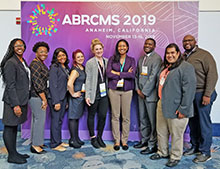


Annual Biomedical Research Conference for Minority Scientists (ABRCMS), one of the largest conferences for underrepresented minorities in STEM, was held in Anaheim, CA, on November 13-16. Clemson’s undergraduates, graduates, postdoctoral fellows, faculty and students joined over 4,650 attendees representing more than 350 colleges and universities. For the third year in a row, BIOE participants served as research presenters, recruiters, session chairs, and poster judges.
According to Dr. Angela Alexander-Bryant, Assistant Professor of Bioengineering and Director of Diversity and Inclusion, “ABRCMS is a unique opportunity for our students to present their research in a diverse and supportive environment while receiving quality feedback and competing for annual research prizes. This year, Clemson microbiology senior and BIOE undergraduate researcher, Kayla Shine, was awarded one of the undergraduate research poster presentation awards in the Engineering, Math, and Physics division.”
In addition to being a bountiful venue for student professional development, ABRCMS is a unique opportunity to share the Clemson BIOE brand with students and university representatives from across the country. Past trips to ABRCMS have yielded strong returns with respect to minority graduate student applications to the department. Dr. Jordon Gilmore, Assistant Professor of Bioengineering, noted, “We expect this trend to continue with another strong recruiting effort this year spearheaded by BIOE graduate students Margarita Portilla and Simeon McKelvey.
Dr. Alexander-Bryant served as ABRCMS Vice Chair of the Engineering, Math, and Physics Disciplines. In that role, she facilitated training judges, moderated student oral presentation sessions, and coordinated recruiting efforts for BIOE. She said, “Our greatest take-away from this trip to ABRCMS is that there is a growing positive reputation for Clemson and bioengineering specifically. Several students whom we engaged with mentioned their familiarity with our program and its faculty. As we continue to make an impact in bioengineering, we should be confident that our efforts are making a positive impact on the next generation of bioengineers.”